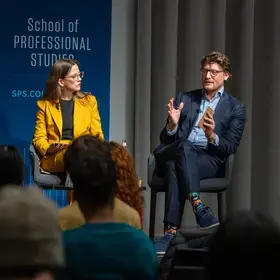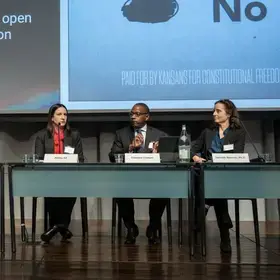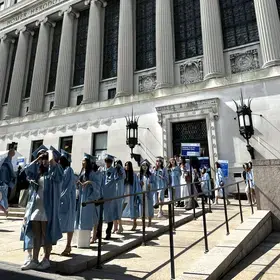Back in June 2021, Columbia School of Professional Studies (SPS) formed its first Diversity, Equity, Inclusion, and Accessibility (DEIA) Committee. Made up of more than 20 administrative staff members and faculty, the committee works to identify and recommend policies to institutionalize diversity, equity, inclusion, and accessibility in SPS’s hiring, curriculum development, learning and development programs, support networks, and other practices.
Matthew E. Vaughan, PhD, is an instructional designer at SPS and a dedicated member of the DEIA Committee. A former public school teacher from Tennessee, Vaughan came to New York in 2011 to complete his doctorate at Union Theological Seminary. His doctoral dissertation in philosophy of education centered around what it means to learn through dialogue.
Vaughan's research focuses on the intersection of theology, teaching and learning, and media studies. His work has appeared in Restoration Quarterly, the Journal of Scriptural Reasoning, and the Christian Scholar’s Review. He sits on the Board of Directors of the American Academy of Religion, supervising all regional affiliates.
In a recent interview, Vaughan spoke about his participation in the committee, how his professional experiences influence his decisions, and why the committee’s work is so important to the School and the University as a whole.
How does your background in religious studies and education inform your role as a DEIA committee member?
As a doctoral student at Union Theological Seminary, I studied interreligious engagement. More specifically, I researched the way religious people learn when talking to people who understand religion (and all that term evokes) differently than they do. I believe very strongly in bringing together folks from different backgrounds and philosophies in ways that might be conducive to learning. I think a lot of good comes when you just get folks talking.
Participating in the work of the DEIA Committee is a natural extension of that academic background. One of the central aims of committees like ours is to reflect—communally, publicly, and humbly—on who is here at SPS and how we can make SPS a safe space for members of our community to learn with and from one another. That is how I like to position my academic work, as well.
What excites you the most about your involvement with DEIA?
Honestly, what excites me is that I am able to meet and work alongside members of our community—such as faculty and students—that I wouldn't normally get to meet and work with in my role as an officer.
If anyone is looking for a great way to connect with more of this wonderful academic community, I can't think of a better way to do so than to participate in the DEIA Committee. I recommend folks attend a few meetings, which are always open to the entire community.
Why is what DEIA’s doing so important for our community?
The work of this committee is critical because it communicates both directly and indirectly to us all that how we structure and live within our community matters. Making an environment safe and conducive to learning does not happen automatically. In fact, it takes a lot of work and intentionality.
We are living in a difficult—though certainly not unprecedented—moment in history. In a variety of cultural, professional, academic, and civic contexts, there is a concerted movement in this country to devalue the diversity that surrounds us. I am really proud that SPS hasn't fallen into that trap.
In your PhD dissertation, you wrote about learning through dialogue: how can this apply to the DEIA committee?
My thesis in the dissertation was simple: We learn when we talk with folks who are different from us. But not all talk is conducive to learning. So I think one of the many responsibilities of the DEIA Committee is to suggest and model context-specific ways of talking that lead to learning. That might sound simple, but I don't think it is. And I applaud the many thoughtful folks on that committee who take very seriously their role in making SPS better.
What movies or novels do you think have done a good job of examining the values of diversity, equity, inclusion, and accessibility?
I actually want to answer that through music. I spend a lot of time in New Orleans, and I really love jazz. One of the things I love about jazz—and indeed New Orleans!—is that there's nothing monolithic about it. The very nature of the genre is interdisciplinary. It's experimental, improvisational, and by definition, controversial. And it doesn't always work.
I think that jazz provides a decent analogy for the work of our DEIA Committee. When we bring lots of different people together to make a single, coherent product—one the purpose and function of which we don't always agree on—there are bound to be both challenges and hiccups. But like a good jazz band, when a committee works, it's unlike anything else in its complexity and potential.
About the Committee
The purpose of the DEIA Committee is to help guide and support the school’s vision of a diverse, equitable, inclusive, and accessible community in which every voice is heard, community members have a sense of belonging and connection with one another and to the school, and everyone feels empowered. The DEIA Committee is charged with assisting in the development of a supportive environment where students, staff, faculty, alumni and affiliates feel safe, seen, heard and included, and as such, can learn, grow, and achieve success without barriers. If you have questions, feedback, or suggestions, or you want to get involved with diversity initiatives at SPS, send us an email at spsdiversity [[at]] columbia [[dot]] edu (spsdiversity[at]columbia[dot]edu)


